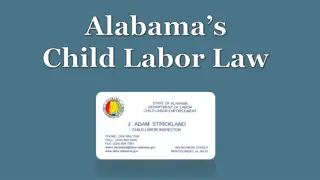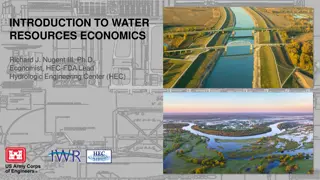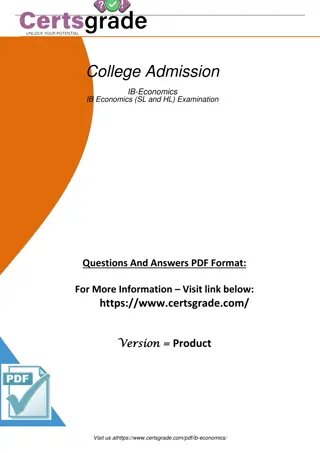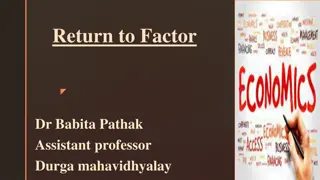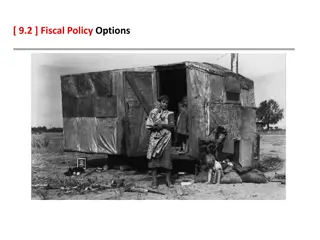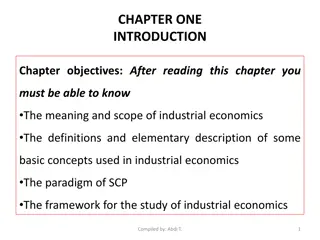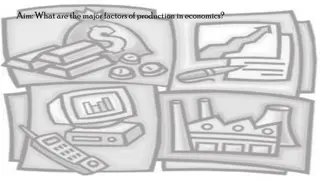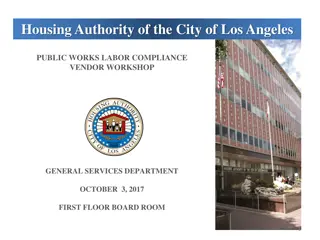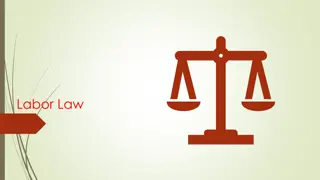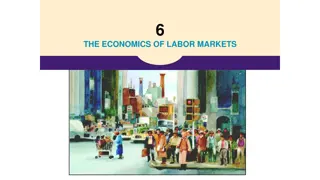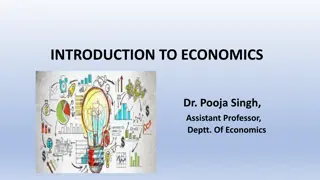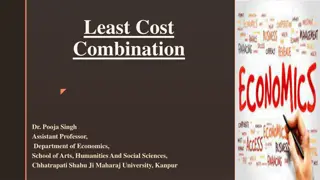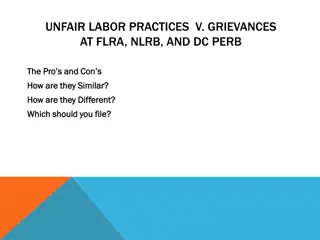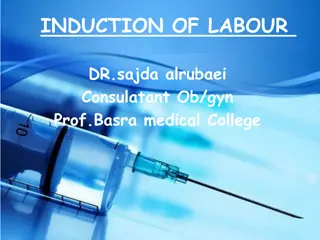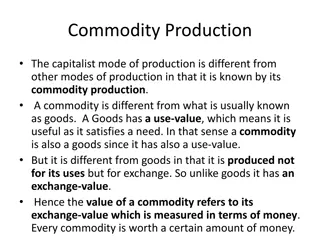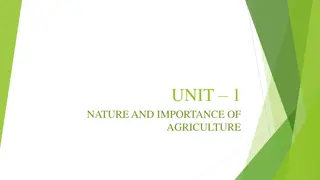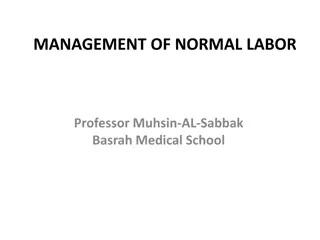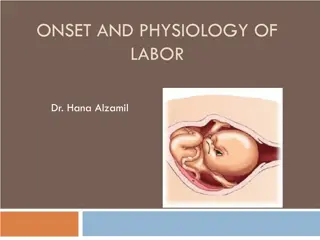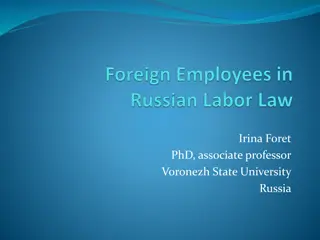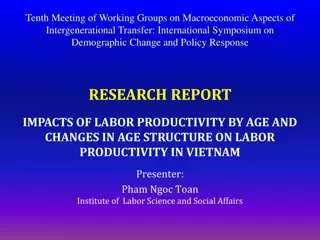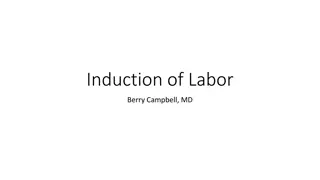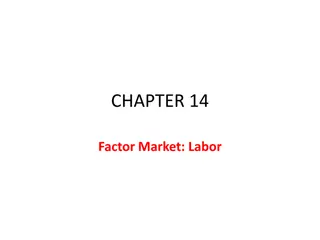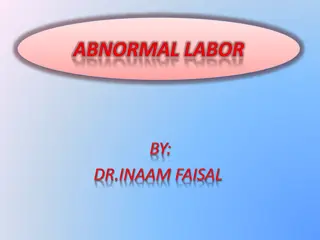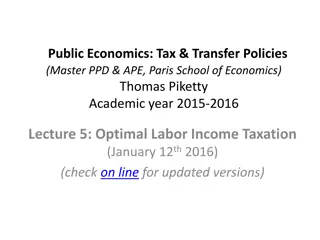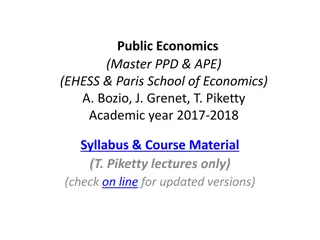Debates on the Mode of Production in Indian Agriculture
Dr. S. Mehdi Abbas Zaidi and Ms. Bushra Fatima discuss the elements of production in Indian agriculture, including the objects of labor, instruments of labor, and the role of labor itself. They explain how these components interact to form the productive power of labor and shape the relations of pro
1 views • 19 slides
Guidelines for Induction of Labor in Family Medicine Forum 2023
The new SOGC Induction of Labor Guidelines 2023 were introduced at the Family Medicine Forum by Dr. Hannah Shenker and Dr. Helen Mavromichalis from McGill University. The presentation discussed various scenarios for inducing labor and highlighted key recommendations, including the importance of shar
0 views • 41 slides
Employment and Labor Law in Russia: Overview and Legal Rights for Foreigners
Irina Foret, PhD, an associate professor at Voronezh State University, provides valuable insights into the general issues surrounding employment and labor law in Russia, with a focus on the legal status of foreigners, work permits, and protection of labor rights. The Russian Federation extends right
2 views • 27 slides
Understanding Water Resources Economics
This resource introduces the principles of water resources economics, focusing on decision-making, cost-benefit analysis, and the role of economics in flood risk management and national development. It discusses how economics influences individual and government decisions in managing limited resourc
3 views • 14 slides
Introduction to Experimental Economics by John Hey: A Comprehensive Overview
Explore the interconnected realms of Experimental Economics and Behavioral Economics through the insightful lectures of John Hey, an Emeritus Professor at the University of York. Discover the methodology of testing economic theories for validity and the practical applications of experimental economi
1 views • 58 slides
Alabama Child Labor Law Guidelines
Alabama's Child Labor Law establishes regulations concerning the minimum age to work, exemptions for certain types of work like lemonade stands and agriculture, requirements for Child Labor Certificates, eligibility criteria for minors aged 14 and 15, the necessity of displaying labor law posters, r
1 views • 28 slides
Understanding Water Resources Economics and Public Policy
Explore the foundations of water resources economics through topics such as decision-making, public economics perspectives, flood control acts, cost-benefit analysis, and optimization. Gain insights into how economics influences individual, household, organizational, and governmental decision-making
4 views • 15 slides
Explore Economics as a Leaving Certificate Subject
Economics as a Leaving Certificate subject prepares students for diverse career paths in business, finance, and management. The course includes a research project and a structured exam format. With a focus on theory, practical application, and real-world economic concepts, Economics equips students
5 views • 11 slides
Elevate Your Scores Master the IB Economics (SL and HL) Examination
Unlock your potential and excel in the IB Economics (SL and HL) Examination with our comprehensive study resources. Access practice exams, study guides, and expert tips to boost your scores. Start your journey towards academic success now!\nClick Here to Get IB-Economics Dumps With 16 USD Discount C
0 views • 7 slides
Understanding the Concept of Return to Factor in Production Economics
Return to Factor is a key concept in production economics that explains the relationship between variable inputs like labor and total production output. The concept is based on the three stages of production - increasing returns, diminishing returns, and negative returns. By analyzing the behavior o
0 views • 7 slides
Understanding the Positive/Normative Distinction in Economics
Textbooks in economics often teach the Positive/Normative Distinction, where Positive Economics deals with facts and Normative Economics focuses on values and opinions. This distinction is a point of debate among scholars, with some arguing that values are intrinsic to all analysis. The debate also
0 views • 28 slides
Understanding Fiscal Policy Options in Economics
Explore the evolution of economic theories including classical economics, demand-side economics, and supply-side economics. Learn about the impact of key figures like John Maynard Keynes and Milton Friedman on fiscal policy decisions and the U.S. economy. Delve into the strategies employed during th
0 views • 18 slides
Overview of Industrial Economics: Scope, Evolution, and Challenges
Industrial economics delves into economic issues of firms and industries, exploring their interactions with society. This chapter discusses the meaning and scope of industrial economics, its historical evolution from classical to contemporary theories, traditional concerns like firm performance and
0 views • 71 slides
Understanding the Major Factors of Production in Economics
Factors of production in economics encompass land, labor, capital, and entrepreneurship. Land represents natural resources, labor involves human effort, capital includes tools and machinery, and entrepreneurs drive innovation and risk-taking. These factors are essential for producing goods and servi
0 views • 10 slides
Public Works Labor Compliance Vendor Workshop by Housing Authority of the City of Los Angeles
The Housing Authority of the City of Los Angeles conducted a workshop to assist contractors in understanding their Public Works labor compliance responsibilities. The workshop covered topics such as contractor responsibilities, registration with the state under SB854, federal and state labor laws, a
1 views • 26 slides
Overview of Labor Law and Union Formation Process
Labor law governs the structure and operations of private labor relations in the United States. The National Labor Relations Act (NLRA) establishes the National Labor Relations Board (NLRB) to handle unfair labor practices in the private sector. The process of forming a union involves reaching out t
0 views • 11 slides
Economics of Labor Markets: Factors of Production and Labor Demand
The Economics of Labor Markets explores the markets for factors of production such as labor, land, and capital. Demand for these factors is derived from firms' decisions to produce goods. The labor market, governed by supply and demand forces, exhibits diminishing marginal product of labor due to fi
0 views • 41 slides
Tackling Child Labor in Uganda's Coffee Sector: A Project Approach
The "Child Education Project Uganda" led by Rashida Nakabuga aims to address the root causes of child labor in Uganda, particularly in the coffee sector. With a focus on poverty, gender inequality, and inadequate education, the project adopts a risk-based due diligence approach at the farm level to
0 views • 17 slides
Understanding Economics: Concepts and Principles Explained
Economics, derived from the Greek word Oikonomia, focuses on managing resources to achieve maximum output and satisfaction. It encompasses the study of wealth, choice-making, and dynamic growth. The discipline emphasizes the role of factors of production - land, labor, and capital - in generating in
2 views • 15 slides
Principles of Least Cost Combination in Economics
In economics, the principle of least cost combination involves determining the optimal combination of factors of production (such as capital and labor) that allows a firm to achieve maximum output at minimum cost. This is achieved by identifying the point where the isoquant curve intersects the isoc
1 views • 4 slides
Qualities of a Successful Economics Teacher
The role of an economics teacher is crucial in shaping students' understanding and knowledge. The qualities of an effective economics teacher include expertise in economics, mastery of teaching methodologies, use of innovative teaching techniques, and a commitment to ongoing professional development
1 views • 6 slides
Understanding Unfair Labor Practices vs. Grievances at FLRA, NLRB, and DC PERB
Unfair labor practices (ULPs) are violations of federal labor laws, while grievances involve disputes between labor organizations and agencies. Different reviewing authorities handle these matters: FLRA for federal, NLRB for private sector, and DC PERB for DC government agencies. Each organization h
0 views • 47 slides
Overview of Induction of Labour for Obstetric Practice
Induction of labor is the artificial initiation of the labor process before it begins naturally. This procedure is performed in cases such as premature rupture of membranes, prolonged pregnancy, preterm premature rupture of membranes, pre-eclampsia, and maternal medical conditions like diabetes or c
1 views • 30 slides
Labor Clauses with Institutionalized Cooperation Measures in FTAs: A Win-Win Outcome in North-South Relations
Labor provisions in Free Trade Agreements (FTAs) have been a subject of debate, with key discussions focusing on whether they benefit workers, prevent protectionism, and promote economic development. Research suggests that including labor clauses with institutionalized cooperation measures can have
0 views • 25 slides
Labor-Management Forum Reporting Tool Analysis
The Problem Resolution Subcommittee's presentation to the National Council on Federal Labor-Management Relations on January 15, 2014, highlighted the development and outcomes of the Labor-Management Forum (LMF) Reporting Tool. The tool aimed to address specific problems, identify barriers, and showc
0 views • 20 slides
Understanding Commodity Production and Labor in Capitalist Mode
The capitalist mode of production is characterized by commodity production, where goods are produced not for their use but for exchange. The value of a commodity is determined by its exchange value, measured in money, which is influenced by the quantity of labor involved in its production. Labor, be
0 views • 8 slides
Understanding the Significance of Agriculture Economics in India
Agriculture plays a crucial role in the Indian economy, contributing significantly to GDP and rural livelihoods. Agriculture Economics involves the study of resource allocation in the production, distribution, and consumption of agricultural goods. This branch of economics blends principles from gen
0 views • 24 slides
Comprehensive Guide to the Management of Normal Labor by Professor Muhsin-AL-Sabbak
Understanding the management of normal labor is crucial for healthcare professionals. This comprehensive guide covers the definition of normal vaginal delivery, diagnosis of labor, stages of labor, phases of labor, and the use of tools like partogram and cardiotocography to monitor progress. Profess
0 views • 9 slides
Physiology of Labor: Onset and Key Hormonal Changes
Labor, or parturition, involves uterine contractions leading to the fetus's expulsion. Factors triggering labor include hormonal changes like increased estrogen and decreased progesterone, which stimulate uterine muscle activity. Telocytes play a role in spontaneous uterine activity, while oxytocin
0 views • 36 slides
Migration Policies and Labor Laws in Russia: A Comprehensive Overview
Irina Foret, PhD, an associate professor at Voronezh State University, delves into the legal status of foreigners in Russia, including work visas, labor rights violations, and legal remedies. Key aspects such as Article 62 of the Constitution and Article 11 of the Labor Code are discussed, highlight
0 views • 30 slides
Impacts of Labor Productivity by Age and Changes in Age Structure on Labor Productivity in Vietnam
This research focuses on quantifying the impact of labor productivity by age on the overall economy's labor productivity in Vietnam. Utilizing analytical methods like the Cobb-Douglas production function and Shift-Share Analysis, the study aims to understand how changes in age structure and labor sh
0 views • 26 slides
Induction of Labor: Methods and Considerations
Induction of labor is done to achieve vaginal delivery before spontaneous onset, usually at 39 weeks or when medically necessary. Risks include failed induction, cesarean section, uterine rupture, prolonged labor, and infections. Cervical ripening methods help prepare the cervix for labor. The Bisho
0 views • 18 slides
Understanding Competitive Factor Market in Labor Economics
A competitive factor market involves a large number of sellers and buyers of a factor of production, like labor. With no single entity influencing prices, each acts as a price taker. The demand for factors depends on firms' output levels and input costs, leading to derived demands. Profitability of
0 views • 43 slides
Understanding Labor Productivity Growth in Europe: Insights from Productivity Project Conference
Divergent experiences in labor productivity growth between the US and Europe have sparked interest in analyzing factors affecting productivity. The Productivity Project Conference in January 2015 delved into macro and micro-level determinants of labor productivity, focusing on Total Factor Productiv
1 views • 27 slides
Department of Employment and Labour: Vision, Mandate, and Objectives
The Department of Employment and Labour aims to regulate the labor market through policies focusing on economic efficiency, decent employment, labor standards, and social safety nets. The department's vision is to create a conducive labor market for investment, economic growth, employment, and decen
0 views • 35 slides
Understanding Economics: Demand, Supply, and Equilibrium
Explore the fundamental concepts of economics, including the nature and scope of economics, demand, and its determinants. Learn about normative and positive economics, microeconomics, macroeconomics, and the factors affecting demand such as income, price of the good, and complementary goods. Gain in
0 views • 19 slides
Understanding Abnormal Labor and Prolonged Labor in Childbirth
Labor is considered abnormal when there is poor progress or signs of compromise in the fetus. Prolonged labor, lasting more than 18 hours, may result from various factors affecting cervical dilatation and descent of the presenting part. Causes include issues with power, passage, and passenger. Diagn
0 views • 20 slides
Understanding Economics: Explore the World of Scarce Resources, Prices, Government Policies, and Global Impacts
Delve into the intriguing realm of economics with Mr. Moosajee at HGS! Unravel the mysteries behind how scarce resources are allocated, why prices fluctuate, the impact of government policies, concerns about inflation, strategies for reducing unemployment, and more. Discover the relevance of economi
0 views • 20 slides
Optimal Labor Income Taxation: Main Theoretical Results and Intuitions
The optimal taxation of labor income involves a U-shaped pattern of marginal tax rates, with top rates influenced by income concentration and labor supply elasticities. Mirrlees' model analyzes optimal labor income taxes based on productivity and labor supply decisions, aiming to maximize social wel
0 views • 24 slides
Public Economics Course Summary - EHESS & Paris School of Economics
The Public Economics course at EHESS & Paris School of Economics offers an introduction to taxation history, government intervention theories, and policy incidence across developed and developing countries. The syllabus covers topics like welfare analysis, wealth taxation, and optimal taxation strat
0 views • 11 slides





